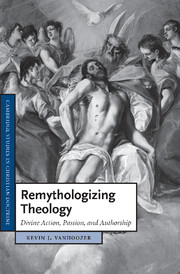Book contents
- Frontmatter
- Contents
- Preface
- Introduction: What is remythologizing?
- Part I “God” in Scripture and theology
- Part II Communicative theism and the triune God
- Part III God and World: authorial action and interaction
- 6 Divine author and human hero in dialogical relation
- 7 Divine communicative sovereignty and human freedom: the hero talks back
- 8 Impassible passion? Suffering, emotions, and the crucified God
- 9 Impassible compassion? From divine pathos to divine patience
- Conclusion: Always remythologizing? Answering to the Holy Author in our midst
- Select bibliography
- Index of subjects
- Index of scriptural references
7 - Divine communicative sovereignty and human freedom: the hero talks back
Published online by Cambridge University Press: 04 May 2010
- Frontmatter
- Contents
- Preface
- Introduction: What is remythologizing?
- Part I “God” in Scripture and theology
- Part II Communicative theism and the triune God
- Part III God and World: authorial action and interaction
- 6 Divine author and human hero in dialogical relation
- 7 Divine communicative sovereignty and human freedom: the hero talks back
- 8 Impassible passion? Suffering, emotions, and the crucified God
- 9 Impassible compassion? From divine pathos to divine patience
- Conclusion: Always remythologizing? Answering to the Holy Author in our midst
- Select bibliography
- Index of subjects
- Index of scriptural references
Summary
For until men recognize that they owe everything to God, that they are nourished by his fatherly care, that he is the Author of their every good, … they will never yield him willing service.
(Calvin, Inst. I.2.1)Today, if you hear his voice, do not harden your hearts.
(Heb. 4:7)Part II set out the contours of a theodramatic metaphysics, providing categories for describing what God the Father has said and done to renew all things in Jesus Christ through the Holy Spirit. Being-in-communicative-activity was the leading concept, and we even went so far as to describe the reality of angels in these terms. Chapter 6 introduced the analogy of authorship in order to set forth the nature of God's distinct communicative agency. The present chapter continues our exploration of authorship as a rubric with which to both distinguish between and relate the respective communicative agencies of God and human beings. In particular, we examine what happens when free human heroes “talk back” to their divine author in ways that either advance the communicative exchange or stop it defiantly in its tracks.
His dark materials: does God author evil?
Surely we have proved too much? If God is the author of the “person-idea” that heroes freely (though necessarily) work out, does it not follow that God is ultimately responsible for what the evil- doing villains do as well?
- Type
- Chapter
- Information
- Remythologizing TheologyDivine Action, Passion, and Authorship, pp. 338 - 386Publisher: Cambridge University PressPrint publication year: 2010

